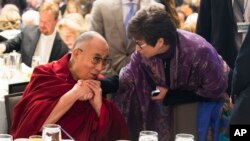China is opposed to foreign countries receiving the Dalai Lama, a government spokesman said Friday, one day after the Tibetan spiritual leader attended the annual National Prayer Breakfast in Washington.
Chinese Foreign Ministry spokesman Hong Lei told reporters in Beijing that the Dalai Lama was a "political exile who has long been engaged in anti-China separatist activities under the pretext of religion."
President Barack Obama did not meet directly with the Dalai Lama Thursday, but they were seated a short distance away from each other and exchanged greetings.
Obama praised him as a man of compassion, ignoring China's earlier protest against any American involvement with the exiled Tibetan spiritual leader.
"I want to offer a special welcome to a good friend, His Holiness the Dalai Lama, who is a powerful example of what it means to practice compassion and inspires us to speak up for the freedom and dignity of all human beings," Obama told about 3,600 religious and political leaders at the annual gathering.
Despite the Dalai Lama's insistence that he is only seeking autonomy for Tibet, China views the spiritual leader as a dangerous separatist, and regularly condemns world leaders who meet with him.
"We are against any country’s interference in China’s domestic affairs under the pretext of Tibet-related issues, and are opposed to any foreign leader’s meeting with the Dalai Lama in any form,” China's Foreign Ministry spokesman Hong said Tuesday.
Since taking office, President Obama has met the Dalai Lama three times. But none of the meetings has been held in public.
US lawmakers push back
Before the prayer breakfast, two U.S. lawmakers told VOA that Chinese criticism of U.S. interaction with the Dalai Lama is unfounded.
"I think it’s profoundly unfortunate and an act of weakness for the Chinese government," said New Jersey Republican Congressman Chris Smith, "to object to the Dalai Lama’s meeting with the president or members of the Congress or senators and being at the prayer breakfast."
"There are always crackdowns on political dissidents and so I think that the Chinese government should clean up its own act before it criticizes other countries' people for inviting people to the prayer breakfast and other things like that," New York Democrat Eliot Engel said.
In his speech, Obama condemned those who seek to "hijack religion for their own murderous ends."
He called the Islamic State militants who have overtaken parts of Syria and Iraq and beheaded Westerners they have captured a "death cult."
He said that "whatever our faith, we must be instruments of peace."
Many Tibetans in China accuse the government of a campaign of religious and cultural persecution, as the country's majority Han ethnic group continues to move into historically Tibetan areas.
China rejects that, saying Tibetans enjoy religious freedom. Beijing also points to huge ongoing investment it says has brought modernization and an increased standard of living to Tibet.
Since February 2009, more than 126 people have self-immolated in traditionally Tibetan areas of China to protest Beijing's policy in their homeland.
The Dalai Lama and the Tibetan government-in-exile, located in India, are outspoken critics of China's policies but have discouraged the suicide protests.





